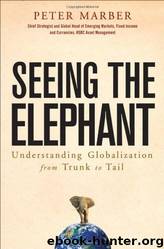Seeing the Elephant: Understanding Globalization From Trunk to Tail by Peter Marber

Author:Peter Marber
Language: eng
Format: mobi, epub
ISBN: 9780470283851
Publisher: John Wiley and Sons
Published: 2009-02-09T06:43:22+00:00
Immigration and Security
The 9/11 attacks and subsequent 2005 London subway bombings have made immigrants appear as the number one terrorist enemy of the Western world. There has been legislation to match this paranoia such as the U.S. Patriot Act requiring photographs and fingerprints of all foreigners entering the United States. Immigration law is now being used as an anti-terrorism tool. Considering that the bureau formerly in charge of immigration policy, Immigration and Naturalization Services, was folded under the Department of Homeland Security umbrella in 2003 and considering the extended wait times for visas, it appears that security—not labor markets—is the chief determinant of U.S. immigration policy post 9/11. But whether these moves actually increased security remains to be seen.
While a bit overblown, there has been a feeling that the biggest impact of post-9/11 legislation has been on the academic community including delaying or denying visas for students and professors from particular countries. According to an administrator at the Massachusetts Institute of Technology, “there is growing anecdotal evidence that while our international student population is, by and large, very happy at school, they are ambivalent about being in the United States . . . [they] report a distinct feeling of unease about the political and cultural climate in the U.S.”57 The students who have traditionally come to the United States to study have been the best and brightest of their home countries. They are clearly intelligent and not oblivious to their environment. The combination of U.S. government legislation and xenophobia seems to be sending a sad but clear message: Go home.
From the moment an international student arrives, his every movement is tracked by the U.S. government through the Student Exchange Visitor Information System (SEVIS), a database that came about as part of the Patriot Act. The program is so comprehensive that it monitors the number of credit hours taken by a student, the student’s major, and other details about their whereabouts. But SEVIS is not only often inaccurate but also chronically out of date.58 In fact, the errors that result in students being detained at airports or other points of entry of the United States are just as, if not more, likely to be the fault of the system as the fault of the student.The burden of proof ends up falling on the student, with the Customs and Border Protection authorities automatically assuming guilty until proven innocent.
This trend is disconcerting given the importance of foreign students to the U.S. economy. International students contribute on average $14.5 billion to the United States annually.59 (See Figure 5.6.) Education is an export of sorts. And today’s international students are often tomorrow’s U.S. researchers and scientists. Nowadays, not only is it tough to study scientific fields in the United States, but it is even more difficult to stay after graduation. In some fields of science, including computer science, mathematics, physical sciences, and engineering, more overseas students are being awarded Ph.D. degrees than Americans. This is not a bad thing:The challenge for the United States is
Download
Seeing the Elephant: Understanding Globalization From Trunk to Tail by Peter Marber.epub
This site does not store any files on its server. We only index and link to content provided by other sites. Please contact the content providers to delete copyright contents if any and email us, we'll remove relevant links or contents immediately.
| Accounting | Economics |
| Exports & Imports | Foreign Exchange |
| Global Marketing | Globalization |
| Islamic Banking & Finance |
50 Economics Classics by Tom Butler-Bowdon(2088)
Six Billion Shoppers by Porter Erisman(2018)
Why Nations Fail: The Origins of Power, Prosperity, and Poverty by Daron Acemoglu & James Robinson(1812)
No Time to Say Goodbye(1792)
The Economist [T6, 22 Thg9 2017] by The Economist(1664)
Red Notice by Bill Browder(1620)
Currency Trading For Dummies by Brian Dolan(1571)
Thank You for Being Late by Thomas L. Friedman(1473)
Bitcoin: The Ultimate Guide to the World of Bitcoin, Bitcoin Mining, Bitcoin Investing, Blockchain Technology, Cryptocurrency (2nd Edition) by Ikuya Takashima(1439)
Amazon FBA: Amazon FBA Blackbook: Everything You Need To Know to Start Your Amazon Business Empire (Amazon Empire, FBA Mastery) by John Fisher(1320)
Coffee: From Bean to Barista by Robert W. Thurston(1206)
The Great Economists by Linda Yueh(1200)
The Future Is Asian by Parag Khanna(1192)
Pocket World in Figures 2018 by The Economist(1170)
Capitalism Without Capital: The Rise of the Intangible Economy by Jonathan Haskel(1142)
Grave New World by Stephen D. King(1128)
How Money Got Free: Bitcoin and the Fight for the Future of Finance by Brian Patrick Eha(1123)
The Sex Business by Economist(1102)
Cultural Intelligence by David C. Thomas(1026)
